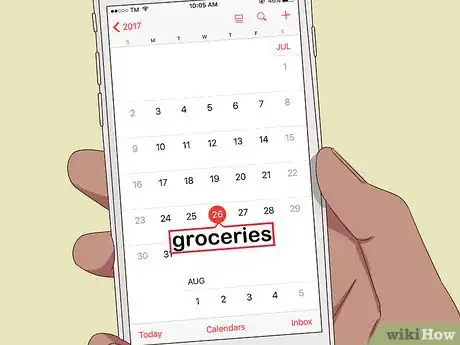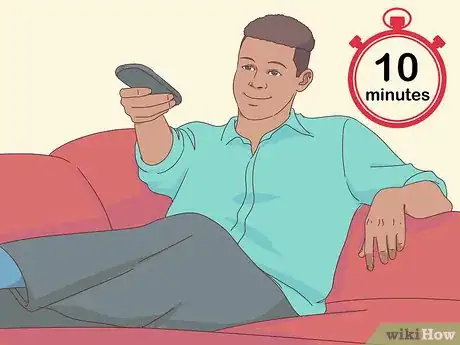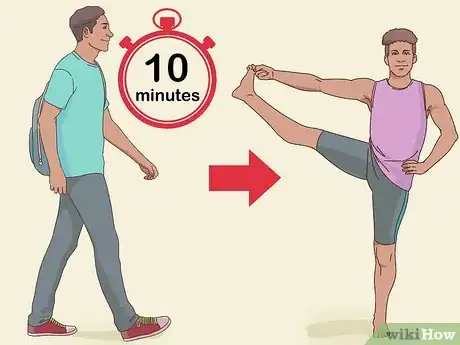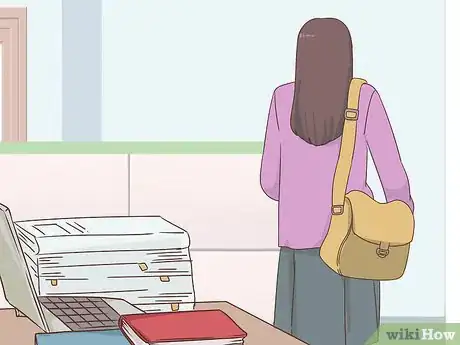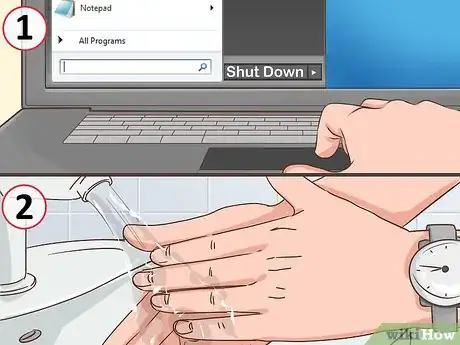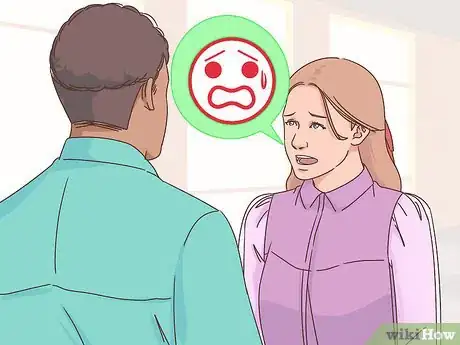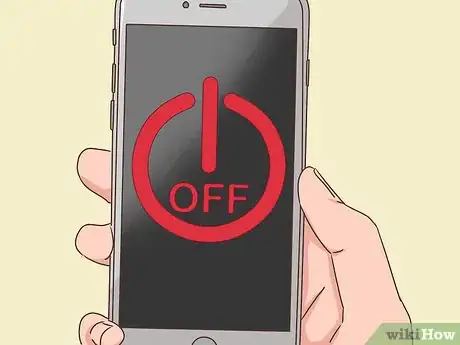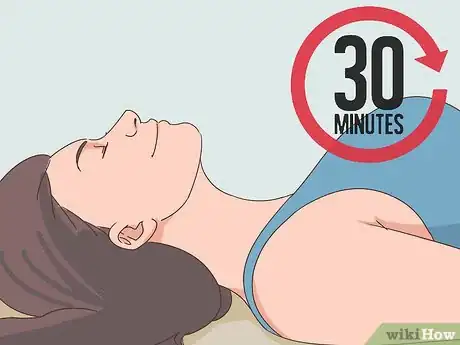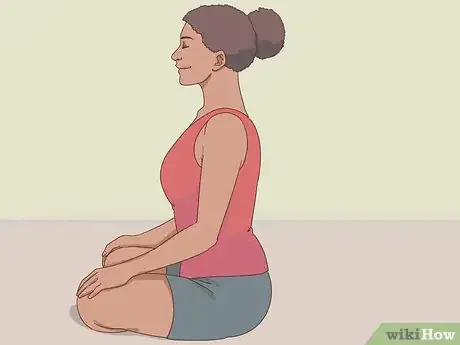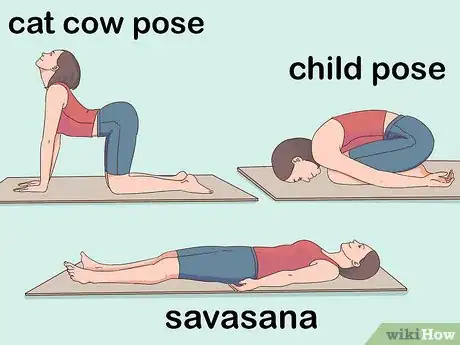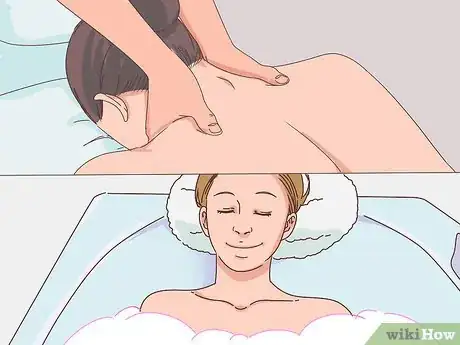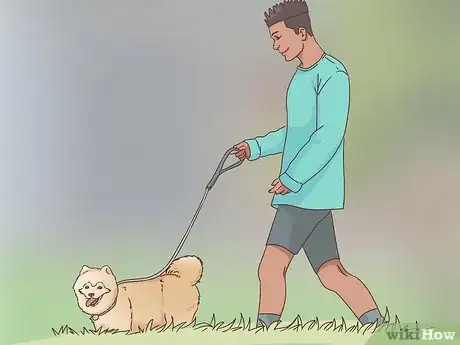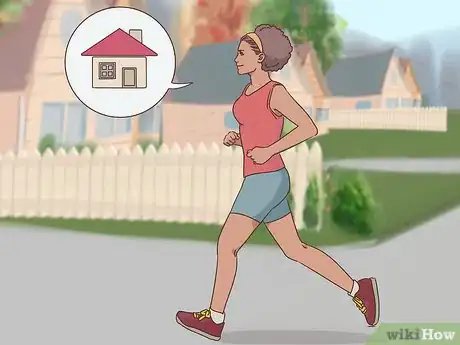This article was co-authored by Leah Morris. Leah Morris is a Life and Relationship Transition coach and the owner of Life Remade, a holistic personal coaching service. With over three years as a professional coach, she specializes in guiding people as they move through both short-term and long-term life transitions. Leah holds a BA in Organizational Communication from California State University, Chico and is a certified Transformational Life Coach through the Southwest Institute for Healing Arts.
There are 19 references cited in this article, which can be found at the bottom of the page.
This article has been viewed 23,367 times.
When you’re ending a difficult workday (or workweek), it’s important to leave work at work and move on with your personal life. Instead of turning toward junk food or television, try listening to music or meditating as a way to feel calm. Make time for fun by seeing loved ones and being in nature. Keep some healthy boundaries so that you don’t get sucked back into work and can do the things you want to do.
Steps
Making the Most of Your Time
-
1Set aside time for unwinding. Schedule your leisure time so that it doesn't get taken over with other responsibilities. Avoid over-committing yourself to social engagements, volunteering, and other things you may not realistically have time for after work.[1] Have some time just for yourself to unwind.[2]
- If you have things to complete after work (like grocery shopping, picking up kids, or attending events), prioritize your tasks and if possible, delegate responsibilities.
- Try to get any important tasks done quickly after you get home from work. Set a rule for yourself not to do any sort of work after a certain time in the evening. Setting aside a regular time to relax before bed will improve your quality of sleep and help you be more productive during the day.
-
2Spend time relaxing as soon as you get home. Don’t put off your time to yourself.[3] If you set aside the first ten minutes after you get home to do something relaxing, you won’t have to squeeze something in later or go a day without having some time to unwind. Even if you have kids or a family, let them know that the first ten minutes after you get home are for you to relax. They can come to you with their questions, needs, and requests once you’re finished.
- Prioritizing time to unwind can help you feel calm as you enter back into your life without too much stress. This is especially helpful if your family tends to bombard you with things as soon as you step through the door.
Advertisement -
3Maximize small pockets of time to unwind. Maybe you notice your nerves or anger acting up after you get home from work. You might not have time for a massage or a 60-minute yoga class, but you likely have time for a ten-minute walk around the block or a five-minute dance session.[4] Taking advantage of small pockets of time can help you feel relaxed and give you a quick reset to feeling better.
- Touch can be quick and calming and can put you in a relaxed state. Get home and give your partner and children a big hug. If you have a pet, spend some time petting them, even if it’s just around television time.[5]
Separating Your Work and Personal Time
-
1Keep work tasks at work. Don’t bring work home with you. Stay after work if you have to, but don’t leave work with tasks to complete at home. Especially when it comes to the weekends, leave your work at the office and focus on enjoying your time off.
- If you’re worried about forgetting something or leaving a task unfinished, write a to-do list for the next work day. That way, you’ll be prepared to complete your tasks the next time you go to work.
-
2Do an after-work ritual. Once you finish the workday, develop a ritual to help you detach and enter into your personal life. For example, shut down your computer, wash your hands, then leave the building. Even closing and locking your office door can become significant and symbolic of leaving your work and entering your personal life. Doing an after-work ritual can help you mentally detach and put your focus elsewhere.[6]
- When doing your after-work ritual, mentally detach from your work. Say to yourself, “I have completed my workday and can enter my personal life.”
-
3Handle your work emotions at work. Especially if you work with people or are in a helping profession, it can be difficult to not bring your work emotions home with you. Whether you’ve had a bad day, experienced a negative interaction, or felt overworked, it’s easy to carry these emotions home with you. While you may need to vent occasionally about a difficult day at work or a difficult encounter, don’t make this a regular routine. Deal with your emotions while at work, not after work.
- For example, talk to a co-worker about your difficult day. You might to start a work journal to help you express your emotions and not carry them over.
- If you do vent to someone at home, try to limit the conversation to about 15 minutes, or 30 if something is really upsetting you and you need to talk through it. Ask the person you are conversing with to gently change the subject if you keep venting for too long.
-
4Keep work electronics turned off. If you have a work computer or cell phone, turn it off or silent when you go home. Keeping a work phone with you is one of the easiest ways to get sucked back into your work. If possible, don’t bring it home with you at all.
- If you’re tempted to check your work email, save it for when you’re in the office. Most things are not urgent and don’t require your immediate attention.
Feeling Calm and Relaxed
-
1Listen to music to match your desired mood. Music can influence your mood. If you want to feel calm, listen to music that helps you feel that way. You may want to listen to upbeat music on your way home to bust stress or listen to calming music to feel relaxed.
- If you’re feeling stressed, listen to music in the background instead of focusing on it. If you need to let your stress out, try singing karaoke.[7]
-
2Breathe deeply. Especially if you feel exhausted or tense from your day, take a few moments to do some deep breathing. Lengthen your breath by pausing between each inhale and exhale. This can help you feel present, calm, and relaxed.
- Try inhaling for four seconds, holding it for four seconds, then releasing for four seconds.
-
3Use aromas to feel calm. Scent can induce feelings and help to shift your mood. Try burning a scented candle, using scented body lotion or shower gel, or applying essential oils to your skin.[8] These scents can help move you into a calm relaxed state fairly quickly.-
- Some relaxing scents include lavender, ylang-ylang, and jasmine.
-
4Do progressive muscle relaxation. You might store tension in your body you don’t even know about. Progressive muscle relaxation helps you to release tensions in your body and put your body into a less tense state. This can also help you bring awareness to where you hold tension in your body, especially work tensions.
- Try tensing and relaxing each muscle from your toes to your head, one by one. For example, tense your toes for five seconds, then release. Move to your ankles, calves, quads, and up your body.[9]
- Create a quiet environment in which to do relaxation exercises, away from distractions and stressors.
- Don’t try to multi-task while you are doing this exercise. Focus entirely on relaxing and being in the moment.
-
5Meditate. Meditation is a great way to get a reset. Some proven benefits include reducing stress, decreasing anxiety and depression, and slowing the effects of aging in the brain.[10] Start with 3-5 minutes of meditation then build up to 15 or 20 minutes.
- There are lots of techniques to try when meditating, including clearing your mind, focusing on a mantra, or focusing on a specific part of your body or your emotions.
- If you are new to meditation, try starting with guided meditation until you feel confident enough to meditate on your own. You can find guided meditation videos online, or download guided meditation apps for your phone.
-
6Do yoga. Whether you attend a yoga class or do poses on your own, yoga can be calming and help you unwind. If you’re looking for a gentle or restorative class, try doing a Hatha yoga or Satyananda class. You might feel refreshed, relaxed, and restored after your class.[11]
- If you’re on your own and want to do some relaxing yoga at home, try the cat cow pose, child pose, and savasana to relax and unwind.
- You don’t have to wait until you leave work to do yoga. Try incorporating some simple seated poses into your daily work routine.[12]
- You can even do a few simple seated poses or breathing exercises in your car or on the bus or train as you commute home from work.[13]
-
7Get pampered with a massage or bath. Set aside some “me” time and give your body some relief. Pampering can help you unwind, reset, and feel relaxed while giving your body a break. While you may not get pampered every day after work, you may be able to schedule weekly or monthly visits for self-care.
- If you’re concerned about the expense, take a look at your budget and see what you are able to set aside each month for pampering yourself. You may also be able to find special deals in your area through services like Groupon.
- Go for a massage, manicure or pedicure. You might want to go to a sauna or steam room to unwind.
- Take a calming bath.[14] Add some aromatic oils to your bath to help you relax even more. Try lavender or jasmine oils.
-
8Don't rely on Alcohol. It’s important to not rely on alcohol as a relaxant to help you unwind as too much alcohol can make you feel worse instead of better. Alcohol can heighten situations and make you feel more anxious! Alcohol isn't metabolized like other foods and drinks. The amount of energy it takes to metabolize large doses of alcohol causes more stress to the body, even if you feel relaxed.
Spending Quality Time with People
-
1Prioritize family time. If you have the choice between completing something for work or spending time with your family, choose your family every time. Being with your family will help you feel good and more involved. Going to your daughter’s baseball games or your son’s karate match can show your kids your support and can help you unwind and enjoy their progress.[15]
- If you don’t have kids or a partner, spend time with your parents, siblings, and extended family. Even a quick phone call or video chat can help you feel connected.
-
2Get together with friends. Nothing quite beats quality time with friends.[16] Get together with a friend for dinner, organize a game night, or meet up while you walk your dogs. Whatever you do, making time for friends can help you unwind, relieve stress, and feel connected.[17]
- Organize a game night every week to encourage your friends to come together and have fun.
- While it’s best to connect in person, you can also video chat or email a friend to catch up and stay in touch.
-
3Laugh and be silly with others.[18] Make fun a priority and do lighthearted activities, especially with others. Whether this is telling jokes, being purposefully silly, or looking at things you know makes you laugh, make time for smiles and laughter. Laughter can lift your mood and help you connect with others.[19]
- Laughter is much more fun when shared with others. Get together with some friends or family and do things that make you crack up. Watch funny videos, play games, and do silly things together.
Doing Fulfilling Activities
-
1Get out in nature. Nature is good for the body and mind. Spend some time in the great outdoors by walking at a park, going on a hike, or biking on a nature path. Being outside can help you de-stress and tune into your senses.[20]
- Even spending some time outside in your backyard with your kids can help you connect with the outdoors.
- If it’s not possible to go out in nature, even looking at photos of nature can help you feel relaxed and less stressed.
-
2Work on your hobby. Have an activity you enjoy that brings you enjoyment and fulfillment. This might be restoring old cars, sewing, drawing, or gardening. Whatever it is, it should relieve your stress and be something you look forward to doing.[21]
- If you don’t have a hobby, pick something up. For example, try a painting class, learn how to blow glass, or attend cooking lessons.
- This activity should feel leisurely, not stressful or draining. If the activity causes you more stress than relief, consider doing a different activity.
-
3Read or watch something funny. Laughter is a great stress-reducer. In the short term, it can help you unwind and stimulate your heart, lungs, and muscles. In the long term, it can improve your overall mood and even boost your immune system.[22] If you’re feeling stressed after work, watch a comedy, read a funny book or blog, or listen to a radio show or podcast that always gets you laughing.
-
4Move your body and exercise. While you might feel too exhausted right after work to exert more energy, motivate yourself to get moving. You don’t have to go to the gym to exercise; it can be as easy as walking your dog or dancing in your living room to some music. Exercise naturally reduces stress and can even help with anxiety and depression.[23]
- If you’re too tempted to just veg out as soon as you get home, try brining your workout clothes with you to work. This will help you avoid having to go home before you exercise.
- If you don’t feel motivated to exercise on your own, see if a co-worker, friend, or family member is interested in being a workout buddy. Exercising with someone else is often more fun, and you can hold each other accountable.
- Pick an activity that’s fun and that you enjoy doing, like cross country skiing or martial arts.
-
5Try doing a grounding exercise while you walk or jog. This could be something as simple as trying to spot five objects you’ve never noticed before, or saying the colors of every house that you pass. This kind of exercise can help keep you in the moment and prevent you from focusing on stressful things.
-
6Step outside of your comfort zone. Trying something new means you’re courageously allowing yourself a new experience with the possibility of enjoying it![24] If you feel bored with your after-work routine or you want to learn something new, try an activity that pushes you slightly out of your comfort zone. This is a great way to mix things up and feel good about yourself.[25]
- For example, try cooking a new cuisine or taking your family to go kayaking for the first time. If you really want to push yourself, try something extreme like skydiving or rock climbing.
Expert Q&A
-
QuestionHow can I decompress mentally?
 Leah MorrisLeah Morris is a Life and Relationship Transition coach and the owner of Life Remade, a holistic personal coaching service. With over three years as a professional coach, she specializes in guiding people as they move through both short-term and long-term life transitions. Leah holds a BA in Organizational Communication from California State University, Chico and is a certified Transformational Life Coach through the Southwest Institute for Healing Arts.
Leah MorrisLeah Morris is a Life and Relationship Transition coach and the owner of Life Remade, a holistic personal coaching service. With over three years as a professional coach, she specializes in guiding people as they move through both short-term and long-term life transitions. Leah holds a BA in Organizational Communication from California State University, Chico and is a certified Transformational Life Coach through the Southwest Institute for Healing Arts.
Life Coach Try doing something really relaxing, such as burning scented candles or taking a long, hot bath.
Try doing something really relaxing, such as burning scented candles or taking a long, hot bath. -
QuestionHow do I let out stress?
 Leah MorrisLeah Morris is a Life and Relationship Transition coach and the owner of Life Remade, a holistic personal coaching service. With over three years as a professional coach, she specializes in guiding people as they move through both short-term and long-term life transitions. Leah holds a BA in Organizational Communication from California State University, Chico and is a certified Transformational Life Coach through the Southwest Institute for Healing Arts.
Leah MorrisLeah Morris is a Life and Relationship Transition coach and the owner of Life Remade, a holistic personal coaching service. With over three years as a professional coach, she specializes in guiding people as they move through both short-term and long-term life transitions. Leah holds a BA in Organizational Communication from California State University, Chico and is a certified Transformational Life Coach through the Southwest Institute for Healing Arts.
Life Coach Try spending time with friends to unwind and take your mind off of your workday.
Try spending time with friends to unwind and take your mind off of your workday. -
QuestionHow do you prioritize yourself?
 Jennifer Butler, MSWJennifer Butler is a Love & Transformation Coach and the Owner of JennJoyCoaching, a life coaching business based in Miami, Florida, although Jennifer works with clients all over the world. Jennifer’s work centers around empowering women who are navigating any stage of the divorce or breakup process. She has over four years of life coaching experience. She is also the co-host of the Deep Chats Podcast along with Leah Morris and the host of season 2 “Divorce and Other Things You Can Handle” by Worthy. Her work has been featured in ESME, DivorceForce, and Divorced Girl Smiling. She received her Masters of Social Work (MSW) from New York University. She is also a Certified Health Coach, a Communications & Life Mastery Specialist, and a Certified Conscious Uncoupling and Calling in “the One” coach.
Jennifer Butler, MSWJennifer Butler is a Love & Transformation Coach and the Owner of JennJoyCoaching, a life coaching business based in Miami, Florida, although Jennifer works with clients all over the world. Jennifer’s work centers around empowering women who are navigating any stage of the divorce or breakup process. She has over four years of life coaching experience. She is also the co-host of the Deep Chats Podcast along with Leah Morris and the host of season 2 “Divorce and Other Things You Can Handle” by Worthy. Her work has been featured in ESME, DivorceForce, and Divorced Girl Smiling. She received her Masters of Social Work (MSW) from New York University. She is also a Certified Health Coach, a Communications & Life Mastery Specialist, and a Certified Conscious Uncoupling and Calling in “the One” coach.
Love & Empowerment Coach Know yourself and love yourself fiercely. In other words, be a partner to yourself. Try meeting your own needs rather than only thinking of the needs of others. Focus on becoming the person you want to be through setting intentions and living out those intentions in your daily life.
Know yourself and love yourself fiercely. In other words, be a partner to yourself. Try meeting your own needs rather than only thinking of the needs of others. Focus on becoming the person you want to be through setting intentions and living out those intentions in your daily life.
References
- ↑ Leah Morris. Life Coach. Expert Interview. 19 June 2020.
- ↑ https://www.helpguide.org/articles/stress/stress-management.htm#manage
- ↑ Jennifer Butler, MSW. Life Coach. Expert Interview. 31 July 2020.
- ↑ Jennifer Butler, MSW. Life Coach. Expert Interview. 31 July 2020.
- ↑ http://www.mentalhealthamerica.net/conditions/rest-relaxation-and-exercise
- ↑ https://www.scientificamerican.com/article/why-rituals-work/
- ↑ https://psychcentral.com/lib/the-power-of-music-to-reduce-stress/?all=1
- ↑ Leah Morris. Life Coach. Expert Interview. 19 June 2020.
- ↑ http://www.mayoclinic.org/healthy-lifestyle/stress-management/in-depth/relaxation-technique/art-20045368?pg=2
- ↑ https://nccih.nih.gov/health/meditation/overview.htm#hed3
- ↑ https://www.helpguide.org/articles/stress/relaxation-techniques-for-stress-relief.htm#yoga
- ↑ http://www.health.com/health/gallery/0,,20899500,00.html#ankle-to-knee-0
- ↑ https://www.honkforhelp.com/explore/2016/car-yoga/
- ↑ Leah Morris. Life Coach. Expert Interview. 19 June 2020.
- ↑ http://www.businessinsider.com/tips-for-work-life-balance-2013-7?op=1/#rgin-group-founder-richard-branson-treat-family-time-as-a-priority-over-work-2
- ↑ Leah Morris. Life Coach. Expert Interview. 19 June 2020.
- ↑ https://www.helpguide.org/articles/stress/stress-management.htm#healthy
- ↑ Jennifer Butler, MSW. Life Coach. Expert Interview. 31 July 2020.
- ↑ https://www.psychologytoday.com/articles/200011/the-science-laughter
- ↑ https://greatergood.berkeley.edu/article/item/what_happens_when_we_reconnect_with_nature
- ↑ https://www.helpguide.org/articles/stress/stress-management.htm#fun
- ↑ http://www.mayoclinic.org/healthy-lifestyle/stress-management/in-depth/stress-relief/art-20044456
- ↑ https://www.helpguide.org/articles/stress/stress-management.htm#moving
- ↑ Jennifer Butler, MSW. Life Coach. Expert Interview. 31 July 2020.
- ↑ https://www.psychologytoday.com/blog/happiness-in-world/201004/trying-new-things
